Submitted by Rebekah Wilce on
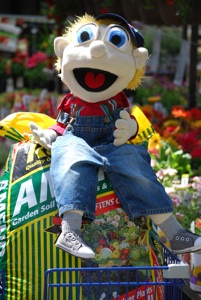 (This article has been corrected to reflect that the co-creator of the kids' gardening puppet is not employed by Kellogg Garden Products but that Kellogg has sponsored some of the puppet's gardening events. In communications with the Center, the co-creator of the puppet, Lisa Ely, has shared her view that the puppet is an educational tool and not a marketing tool for Kellogg to reach families and kids interested in gardening. The puppet was created before Kellogg began sponsoring some of its events at gardening stores that market Kellogg's sludge-based products.)
(This article has been corrected to reflect that the co-creator of the kids' gardening puppet is not employed by Kellogg Garden Products but that Kellogg has sponsored some of the puppet's gardening events. In communications with the Center, the co-creator of the puppet, Lisa Ely, has shared her view that the puppet is an educational tool and not a marketing tool for Kellogg to reach families and kids interested in gardening. The puppet was created before Kellogg began sponsoring some of its events at gardening stores that market Kellogg's sludge-based products.)
A new puppet's in town! His name is Karden, and according to his PR, he shows kids how much fun gardening can be. What parents and teachers aren't told is that he is actually also being used as a marketing tool for sewage sludge merchant Kellogg Garden Products.
Books featuring Karden, available at common bookstores, and an "Idea Factory" website devoted to him, are full of gardening activities for parents and teachers to do with their kids. Karden throws free kids' gardening events at bookstores and hardware stores.
Lisa Ely, one of the two creators of the character, is listed on a gardening website about "Karden's Corner" as "an award-winning television producer and owner of one the newest production companies in Los Angeles focused on documentary television." But while she has, indeed, produced such reality TV shows as CBS's "The Amazing Race," Discovery Channel's "Verminators," and TLC's "America's Ugliest," Ely's Facebook page lists no production company. As of November 9, 2011, her home page listed Kellogg as her employer:
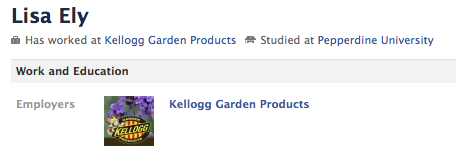
(Ely has since removed this reference on her Facebook page and contacted the Center to state that she was "never employed by Kellogg." She stated that the reference to her working at Kellogg must have have been added by someone else. She stated that Kellogg has sponsored some gardening events of Karden, including a grade school garden competition and that such "sponsorship was a business transaction," but not one that involved her acting as an employee of Kellogg.)
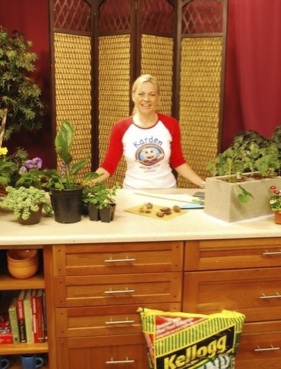 While Ely was busy producing TV shows about what creepy-crawlies are "grossest," and featuring "gnarly infestations," Kellogg, was busy buying composted, concentrated sewage sludge from municipalities like Los Angeles, via its "Inland Empire Regional Composting Authority," and repackaging and greenwashing it as "compost." Kellogg has been in the sludge slinging business since 1925.
While Ely was busy producing TV shows about what creepy-crawlies are "grossest," and featuring "gnarly infestations," Kellogg, was busy buying composted, concentrated sewage sludge from municipalities like Los Angeles, via its "Inland Empire Regional Composting Authority," and repackaging and greenwashing it as "compost." Kellogg has been in the sludge slinging business since 1925.
Sewage sludge contains toxic and hazardous materials, including large numbers of endocrine disruptors and several heavy metals, along with carcinogenic flame retardants, pharmaceutical residues, phthalates, industrial solvents, resistant pathogens, and perfluorinated compounds, which can bioaccumulate in gardens and in the human body.
A recent test of Kellogg's Amend and Nitrohumus found high levels of cancer-causing dioxins.
"If the ingredients aren't listed, you may want to look at buying a different bag."
One of the suggested kids' activities in Karden's "Idea Factory" is choosing bagged potting soil. Karden, who's supposed to have just toured "Kellogg's soil factory," says he "learned that when shopping for potting soil, the most important thing you can do is look for a bag that lists quality ingredients and gives a satisfaction guarantee. The ingredients should be listed on the bags of soil you're buying, almost like the food you buy from the grocery store. If the ingredients aren't listed, you may want to look at buying a different bag."
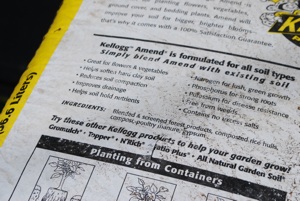 Although Kellogg's "Amend" product, as pictured on the kids' activity page, sports a list of ingredients, it does not list sewage sludge or even the sludge industry's Orwellian PR euphemism, "biosolids." It does list "compost."
Although Kellogg's "Amend" product, as pictured on the kids' activity page, sports a list of ingredients, it does not list sewage sludge or even the sludge industry's Orwellian PR euphemism, "biosolids." It does list "compost."
One must look on Kellogg's website, rather than its packages, to find what is meant by "compost":
"Compost from biosolids ... comes from wastewater treatment plants in different communities throughout the U.S. (Our compost comes mostly from the Inland Empire.) You might find it in our Amend, Gromulch, or Topper products -- depending on where they're bagged. And this type of compost is always in bags of Nitrohumus."
What parent, with kids in tow, would put a bag of fertilizer that says it contains something as innocuous-sounding as "compost" back on the shelf until they can go home and look up Kellogg's definition tucked away on the web?
Sludge Obstacles
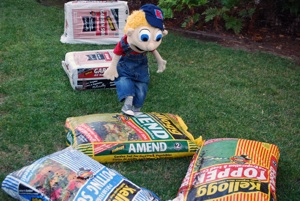 Another activity in Karden's "Idea Factory" is setting up and playing in an "obstacle course" made of Kellogg products, including Amend and Topper, made from industrial and human sewage sludge.
Another activity in Karden's "Idea Factory" is setting up and playing in an "obstacle course" made of Kellogg products, including Amend and Topper, made from industrial and human sewage sludge.
More Children Gardening in Sludge
Karden's Corner, Kellogg and Lowe's sponsored a school garden design contest earlier this year. The winner was a young student at Joseph Sims Elementary School in Elk Grove, CA.
Kellogg's contribution came in the form of -- what else? -- a "soil donation" to the school.
As we've reported, Kellogg has contributed the products it sells, many of which contain "biosolids," to at least thirteen schools in the Los Angeles area and to a rooftop community garden on skid row.
As for Karden, you may find him at a garden store near you, greenwashing the idea of kids gardening in sewage sludge. Parents may want to beware of Kellogg's puppets bearing "gifts" made of contaminated industrial waste.

Comments
Anonymous replied on Permalink
more reality checking...
Lisa Graves replied on Permalink
Dioxin
MaxShelby replied on Permalink
Captive EPA
Progressive Rep... replied on Permalink
What could possibly go wrong
Lisa Graves replied on Permalink
Irwin Mainway